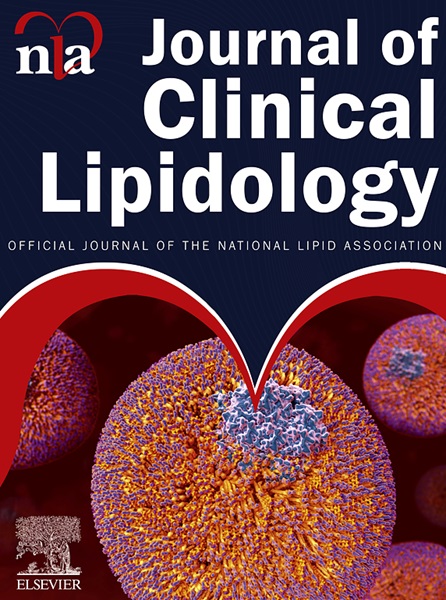冠状动脉微血管功能障碍患者体内丙二醛修饰的低密度脂蛋白循环水平升高
IF 3.6
3区 医学
Q2 PHARMACOLOGY & PHARMACY
引用次数: 0
摘要
冠状动脉微血管功能障碍(CMD)与无阻塞性冠状动脉疾病(CAD)患者的心绞痛症状和不良临床结果有关。据报道,丙二醛修饰的低密度脂蛋白(MDA-LDL)是心外膜冠状动脉粥样硬化开始和加速的标志物。然而,它对 CMD 的影响仍不清楚。我们旨在研究 CMD 与 MDA-LDL 水平之间的关系。这项研究纳入了 95 名未服用降脂药且无阻塞性 CAD 的患者。阻塞性 CAD 的定义是冠状动脉造影术中直径缩小 >50%,或分数血流储备≤0.80。我们对冠状动脉血流储备(CFR)、微循环阻力指数(IMR)和 MDA-LDL 水平进行了回顾性分析。CMD的定义是CFR<2.0或IMR≥25。29(31%)名患者出现了 CMD。CMD患者的MDA-LDL水平明显高于非CMD患者(124.8 ± 37.6 vs. 95.3 ± 29.5 U/L;< 0.01)。单变量逻辑回归分析表明,CMD与MDA-LDL水平之间存在显著关系(几率比(OR):1.03;< 0.01)。在多变量模型中,MDA-LDL 水平与 CMD 显著相关(OR:1.02;< 0.01)。回归分析显示,MDA-LDL水平与CFR(r = -0.42,< 0.01)和IMR(r = 0.35,< 0.01)之间存在明显相关性。在多元回归分析中,MDA-LDL水平与CFR(β = -0.30,< 0.01)和IMR(β = 0.26,= 0.02)独立相关。MDA-LDL水平与无阻塞性CAD患者的CMD相关。本文章由计算机程序翻译,如有差异,请以英文原文为准。
Increased circulating levels of malondialdehyde-modified low-density lipoprotein in patients with coronary microvascular dysfunction
BACKGROUND
Coronary microvascular dysfunction (CMD) is associated with angina symptoms and adverse clinical outcomes in patients without obstructive coronary artery disease (CAD). Malondialdehyde-modified low-density lipoprotein (MDA-LDL) is reportedly a marker of the initiation and acceleration of epicardial coronary atherosclerosis. However, its impact on CMD remains unclear.
OBJECTIVE
We aimed to investigate the relationship between CMD and MDA-LDL levels.
METHODS
This study included 95 patients who did not receive lipid-lowering medications and had no obstructive CAD. Obstructive CAD was defined as >50% diameter reduction on coronary angiography or fractional flow reserve of ≤0.80. We retrospectively analyzed coronary flow reserve (CFR), index of microcirculatory resistance (IMR), and MDA-LDL levels. CMD was defined as either CFR <2.0 or IMR ≥25.
RESULTS
CMD was observed in 29 (31%) patients. MDA-LDL levels were significantly higher in patients with CMD than in those without CMD (124.8 ± 37.6 vs. 95.3 ± 29.5 U/L; p < 0.01). Univariable logistic regression analysis indicated a significant relationship between CMD and MDA-LDL levels (odds ratio (OR): 1.03; p < 0.01). In the multivariable model, MDA-LDL levels were significantly associated with CMD (OR: 1.02; p < 0.01). Regression analysis showed a significant correlation between MDA-LDL levels and CFR (r = -0.42, p < 0.01) and IMR (r = 0.35, p < 0.01). In the multiple regression analysis, MDA-LDL levels were independently associated with CFR (β = -0.30, p < 0.01) and IMR (β = 0.26, p = 0.02).
CONCLUSION
MDA-LDL levels were associated with CMD in patients without obstructive CAD.
求助全文
通过发布文献求助,成功后即可免费获取论文全文。
去求助
来源期刊
CiteScore
7.00
自引率
6.80%
发文量
209
审稿时长
49 days
期刊介绍:
Because the scope of clinical lipidology is broad, the topics addressed by the Journal are equally diverse. Typical articles explore lipidology as it is practiced in the treatment setting, recent developments in pharmacological research, reports of treatment and trials, case studies, the impact of lifestyle modification, and similar academic material of interest to the practitioner.
Sections of Journal of clinical lipidology will address pioneering studies and the clinicians who conduct them, case studies, ethical standards and conduct, professional guidance such as ATP and NCEP, editorial commentary, letters from readers, National Lipid Association (NLA) news and upcoming event information, as well as abstracts from the NLA annual scientific sessions and the scientific forums held by its chapters, when appropriate.

 求助内容:
求助内容: 应助结果提醒方式:
应助结果提醒方式:


